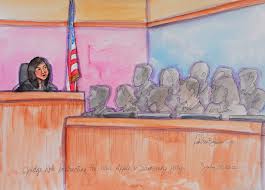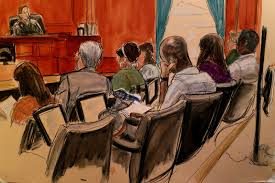I hope many of you read my last blog post “Whoever Wants To Serve on a Civil Jury Trial During a Pandemic Raise Your Hand.” I received some wonderful comments about it, which led me to want to add a bit more to my thoughts on the subject and, hence, this is Part Two of that blog post. I want to add to the list of why it would not be a good thing to start back up civil jury trials right now when only a small percentage of the Georgia population has been vaccinated. That reason is that Covid-19, without dispute, has disproportionately affected African Americans and people of color (BIPOC) than other citizens. Even the CDC admits this. The CDC states:
“There is increasing evidence that some racial and ethnic minority groups are being disproportionately affected by COVID-19. [2], [3], [4], [5], [6] Inequities in the social determinants of health, such as poverty and healthcare access, affecting these groups are interrelated and influence a wide range of health and quality-of-life outcomes and risks.[1] To achieve health equity, barriers must be removed so that everyone has a fair opportunity to be as healthy as possible.”
And yesterday (February 16, 2021) Georgia tied its highest reported daily deaths of 180 from Covid-19, so that hospitalizations may be going down but the death rate is not.
Many Americans are facing substantial economic hardship during the pandemic but evidence-based research shows Latino and Black people experience these hardships at significantly higher rates than white people. According to The Cleveland Clinic, there are many reasons for this, including predisposition to chronic disease, greater exposure to viral infection and potential biological differences.
So it would only make sense that when an African American or other person of color receives a jury summons during this Pandemic, in which Georgia is still experiencing 180 deaths/day, he or she would ask to be excused from jury duty. And I believe the Court should excuse that person, legitimately worried about contracting the virus at the courthouse and becoming ill from it and/or bringing it home to the juror’s family members. What that means is that significantly more African Americans and people of color (BIPOC) jurors will be excused from jury duty, leaving the jury panel from which we select jurors to be skewed with white people, as I discussed in Part One of this blog subject.
We are receiving anecdotal evidence that courts are having a hard time finding jurors willing to serve. Diverse jurors are in short supply. “Nobody wants to serve,” said Lorna Alksne, the presiding judge for the Superior Court in San Diego, which has had an unusually low 5% yield on jury summonses in advance of its first trial this month since last fall. Judges in New York City, Indiana, Colorado and Missouri declared mistrials recently because people connected to the trials either tested positive for the virus or had symptoms. As I have said previously, this is a big concern especially for plaintiffs who cannot afford to pay for experts to attend trial in person, only to have a mistrial declared and then have to pay the experts twice to come to court again. Many courts have worked hard to devise a plan for in-person juries during the Pandemic and these are very thoughtful. Fulton County Court, for example, has implemented a plan to keep jurors safe, but there are, obviously, no guarantees. There is a “Request for Excusal Covid-19 Related” for jurors who don’t want to take that risk. Christopher Adams, a lawyer in Charleston, South Carolina, and president of the National Association of Criminal Defense Lawyers, said “For almost everybody, there is no compelling need for trials to go forward during the pandemic,” he said, adding that most courts are not holding jury trials at the moment.” Mr. Adams said another concern is how representative juries would be if trials went ahead – the virus’ impact and the level of concern about it across different demographics, such as Black, Latino, and elderly populations that are dying at higher rates, could affect who feels safe to serve jury duty. “What we can’t allow is to have trials where there’s not a fair cross section of the community represented,” he said.
Which brings me back to my point. At some point, with members of the community who are African American or Latino understandably asking (and receiving) excusal from jury duty, the jury you are left with will simply not be a true representation of the cross-section of the county in which you are trying the case, and this is not constitutional.
Robin Frazer Clark is a trial lawyer who pursues justice for those who have personal injury claims as a result of being injured in motor vehicle wrecks, trucking wrecks, defective products, defective maintenance of roads, premises safety, medical malpractice and other incidents caused by the negligence of others. Ms. Clark is the 50th President of the State Bar of Georgia, a Past President of Georgia Trial Lawyers Association, a Past President of the Lawyers Club of Atlanta and has practiced law in Georgia for 30 years. She is a member of the International Society of Barristers and of the American Board of Trial Advocates. Mrs. Clark is listed as one of the Top 50 Women Trial Lawyers in Georgia and is a Georgia Super Lawyer. Ms. Clark is the co-host of the Georgia Civil Justice Foundation podcast “See You In Court.”
Robin Frazer Clark ~ Dedicated to the Constitution’s Promise of Justice for All.
 Atlanta Injury Lawyer Blog
Atlanta Injury Lawyer Blog














